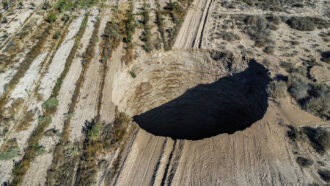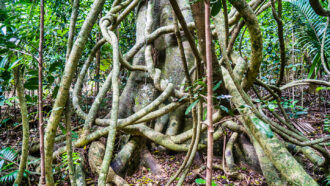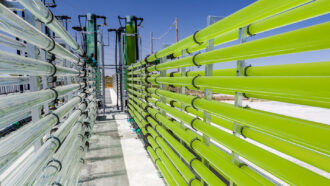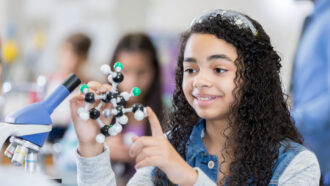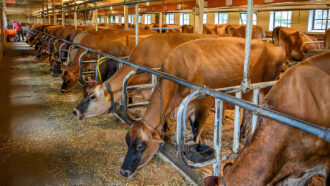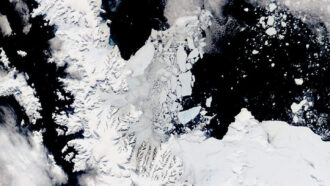This scientist wants to motivate you to fight climate change
Science fiction helps Shahzeen Attari reimagine what our future could look like
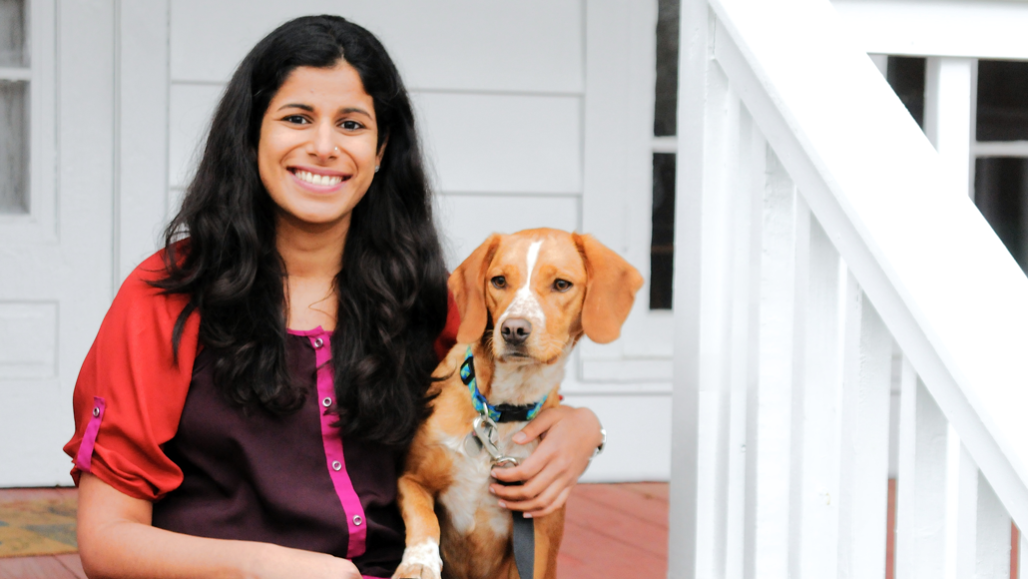
Shahzeen Attari (seen here with her dog Savannah) draws on her personal experiences and interests to explore how science communicators can motivate others to save energy and fight climate change.
Mark Lee
Talking about climate change, energy and conservation is tough. The science can seem complex. So people need to communicate information clearly. Even when they do that, their audience does not always listen. Biases, attitudes and experiences can color their perceptions. Even when people do listen, they may not believe what they hear or want to make changes in their own lives.
Shahzeen Attari studies how people respond to information about climate change. As a scientist at Indiana University Bloomington, she also explores other aspects of how people choose to use energy, water and other resources. Her work is interdisciplinary research. In her case, it involves multiple fields of psychology, engineering and environmental science.
Attari was born in Mumbai, India. She grew up, however, in Dubai. It is part of the United Arab Emirates in the Middle East. She came to the United States as a college student and has lived there since then. In this interview, Attari shares her experiences and advice with Science News for Students. (This interview has been edited for content and readability.)
What inspired you to pursue your career?
Growing up in Dubai, I saw how a desert was quickly transformed into a metropolis, or major city. This happened over a very short time span of about 10 years. So I realized growing up that humans have a very strong and direct impact that can transform nature.
In college, I volunteered for the Nature Conservancy during one spring break. I realized the natural environment is beautiful and magical. I wanted to understand how to protect nature.

Educators and Parents, Sign Up for The Cheat Sheet
Weekly updates to help you use Science News Explores in the learning environment
Thank you for signing up!
There was a problem signing you up.
I also worked in interdisciplinary science labs in college. They basically combine different fields of research to answer questions that sit in the middle of those fields. That gave me a thirst and love for interdisciplinary research.
All these things changed the way I thought about problems. Since then, I’ve been working systematically, trying to understand how people think about climate change and the actions needed to address the problem. And I want to know how we can effectively communicate with people about those topics.
How did you get where you are today?
I studied physics and math in my college engineering program. That was at the University of Illinois Urbana-Champaign. In graduate school I studied engineering and public policy and civil and environmental engineering. I went to Carnegie Mellon University in Pittsburgh, Pa. For my PhD thesis, I studied how people perceive how much energy and water their appliances use.
There have been challenges. In general, people at universities have preferred research that fits into clean, distinct buckets. My research just does not do that. So, I have had to look for places that nurture interdisciplinary research. And it’s hard to work in multiple fields. You have to learn about and gather all the expertise across those fields. Then you need to use that knowledge to solve a problem. That has been really challenging.
Also, women and people of color at universities can experience sexism and racism, based on who we are. But I’ve been blessed with amazing mentors and institutions that nurture diversity.
At times, I felt I had to be very careful about what I did. Dubai is not a completely free state. (Some people in the United Arab Emirates have been arrested for criticizing the government, for example. And women have fewer legal privileges than men.) And in the United States, I was an immigrant. I didn’t have citizenship rights until I finally became a citizen, last December. By then I had lived in the United States for about 20 years.
Now, there’s this freeing sense of becoming more of a scientist and an activist at the same time. There are some scientists who just want to be scientists. I think that needs to change. More scientists need to play a role in communicating with the public and policy makers. We need this most of all in areas like climate change.
How do you get your best ideas?
Inspiration for almost all of the projects I’ve worked on has come from personal challenges and experiences. A lot of it starts from my own curiosity to understand what’s going on with a problem.
As a PhD student, I knew about physics. But even with my training, it was hard for me to quickly understand how much energy different appliances and actions used. I wondered how other people think about that. That became my PhD research.
Then I went to talk about that research at a conference. Someone in the audience stood up. “Hey, you just flew [on an energy-guzzling airplane] to this meeting,” he said. “I don’t want to listen to anything you have to say.” That was really interesting to me. Why didn’t he want to listen to what I had to say? That led to another series of papers. I wanted to understand how scientists’ behaviors affect how people judge them.
What’s one of your biggest successes?
I’m very proud of the papers that grew out of the challenge at that conference. I worked on them with Dave Krantz and Elke Weber at Columbia University. People judge researchers on our energy footprints, we learned. What we do in our personal lives affects how effective our communication is.
We found that scientists who have a bigger “carbon footprint” for home energy use are less likely to change people’s beliefs and behaviors. People are also less likely to support policies to cut carbon emissions if the scientist telling them about the policy has a high carbon footprint.
What’s one of your biggest failures, and how did you get past that?
I’m not the type of scientist that just wants to do science for science’s sake. I want to do science that has broader impacts and that makes a positive change. But I do not feel like my research has helped enough with the problem of climate change. Sometimes I feel like I need to do so much more. I’ve had to work on not taking these failures personally.
What do you do in your spare time?
I go on really long hikes with my dog, Savannah. She’s a hound dog from a shelter. She just flies through the woods, and she has a knack for finding timber rattlesnakes.
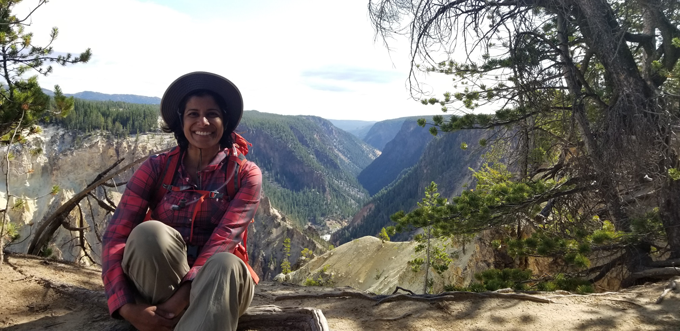
I also love reading science fiction. A lot of these stories talk about the future and time travel and different societies. I love getting lost in the fantasy of these different worlds. They help us reimagine what our world could look like. So now I’ve started a whole new line of research, trying to get people to think about the future. What do they want the future to look like? And what are the pathways of getting there?
What piece of advice do you wish you had been given when you were younger?
I wish someone had told me that failure is okay. As researchers, we get rejected all the time — from getting grants, publishing papers, working on projects and more. Every time you fail, you just have to pick yourself up and start running again.
I learned this through my mentors in college: Follow the questions you want answered, based on your background and personal interests. As a scientist, you can go a really long way talking to people and learning from people. And if something is not in your tool basket, learn from people around you who know about those tools.
And if no one’s done it before, that’s kind of cool, too.
This Q&A is part of a series exploring the many paths to a career in science, technology, engineering and mathematics (STEM). It has been made possible with generous support from Arconic Foundation.
